九年级英语时态复习
- 格式:ppt
- 大小:1.35 MB
- 文档页数:7
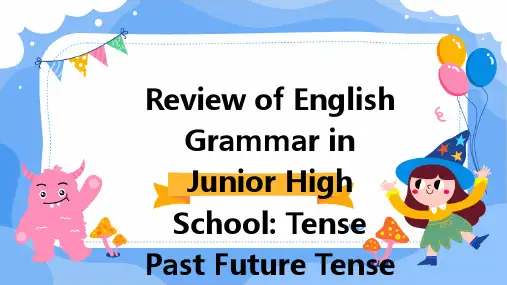

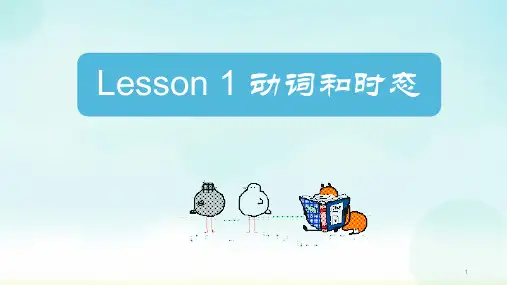

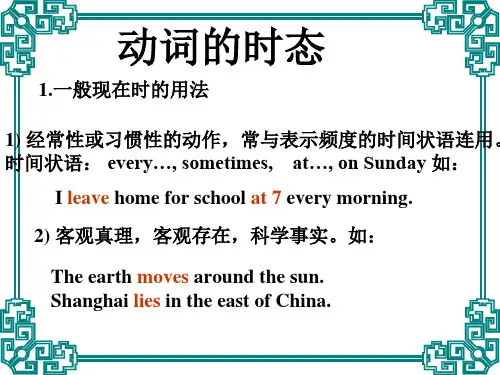
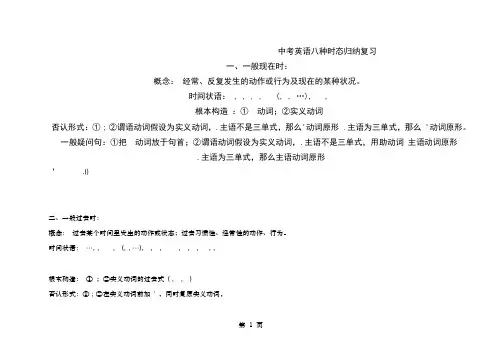
中考英语八种时态归纳复习一、一般现在时:概念:经常、反复发生的动作或行为及现在的某种状况。
时间状语:, , , , (, , …), ,根本构造:① 动词;②实义动词否认形式:① ; ②谓语动词假设为实义动词,.主语不是三单式,那么'动词原形 .主语为三单式,那么 '动词原形。
一般疑问句:①把动词放于句首;②谓语动词假设为实义动词,.主语不是三单式,用助动词主语动词原形.主语为三单式,那么主语动词原形’ .()二、一般过去时:概念:过去某个时间里发生的动作或状态;过去习惯性、经常性的动作、行为。
时间状语:…, , , (, , …), , , , , , , ,根本构造:① ;②实义动词的过去式( , , )否认形式:① ; ②在实义动词前加' ,同时复原实义动词,即’动词原形一般疑问句:① 或放于句首;②用助动词的过去式提问,同时复原实义动词。
.() .()三、现在进展时:概念:表示现阶段或说话时正在进展的动作及行为。
时间状语:, , , ,根本构造:否认形式: .一般疑问句:把动词放于句首。
, .()四、过去进展时:概念:表示过去某段时间或某一时刻正在发生或进展的行为或动作。
时间状语:, , ,或以引导的谓语动词是一般过去时的时间状语等。
根本构造:否认形式: .一般疑问句:把或放于句首。
.().()五、现在完成时:概念:过去发生或已经完成的动作对现在造成的影响或结果,或从过去已经开场,持续到现在的动作或状态。
时间状语:…… , , , , , (几年来,这么多年来),主〔现完〕从〔一过〕〔注意与的区别〕,根本构造:否认形式: .一般疑问句:或主语.()六、过去完成时:概念:以过去某个时间为标准,在此以前发生的动作或行为,或在过去某动作之前完成的行为,即“过去的过去〞。
时间状语:(, …) 过去的时间,主(过完)从(一过)根本构造: . 否认形式: .一般疑问句:放于句首。
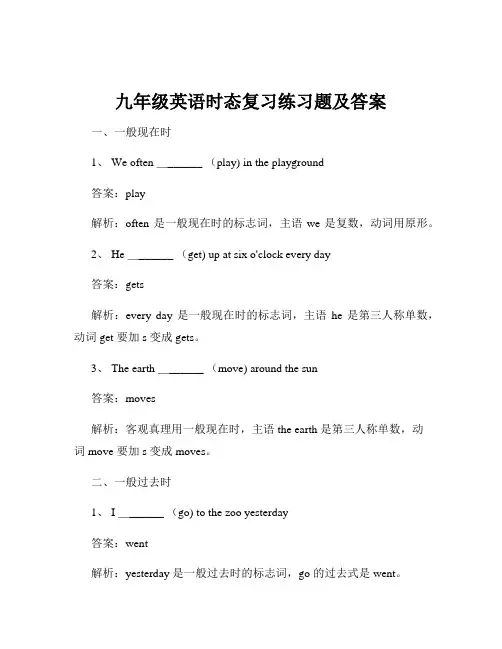
九年级英语时态复习练习题及答案一、一般现在时1、 We often _______ (play) in the playground答案:play解析:often 是一般现在时的标志词,主语 we 是复数,动词用原形。
2、 He _______ (get) up at six o'clock every day答案:gets解析:every day 是一般现在时的标志词,主语he 是第三人称单数,动词 get 要加 s 变成 gets。
3、 The earth _______ (move) around the sun答案:moves解析:客观真理用一般现在时,主语 the earth 是第三人称单数,动词 move 要加 s 变成 moves。
二、一般过去时1、 I _______ (go) to the zoo yesterday答案:went解析:yesterday 是一般过去时的标志词,go 的过去式是 went。
2、 She _______ (be) happy last week答案:was解析:last week 是一般过去时的标志词,主语 she 是第三人称单数,be 动词用 was。
3、 They _______ (not do) their homework last night答案:didn't do解析:last night 是一般过去时的标志词,否定句要用助动词didn't,后面接动词原形 do。
三、一般将来时1、 We _______ (have) a party next week答案:will have / are going to have解析:next week 是一般将来时的标志词,可以用 will +动词原形或者 be going to +动词原形的结构。
2、 He _______ (come) back tomorrow答案:will come / is going to come解析:tomorrow 是一般将来时的标志词,同理可用 will +动词原形或者 be going to +动词原形。
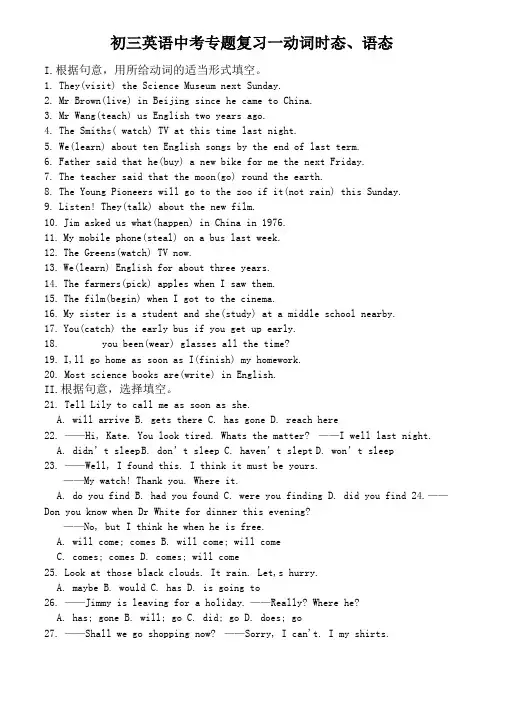
初三英语中考专题复习一动词时态、语态I.根据句意,用所给动词的适当形式填空。
1.They(visit) the Science Museum next Sunday.2.Mr Brown(live) in Beijing since he came to China.3.Mr Wang(teach) us English two years ago.4.The Smiths( watch) TV at this time last night.5.We(learn) about ten English songs by the end of last term.6.Father said that he(buy) a new bike for me the next Friday.7.The teacher said that the moon(go) round the earth.8.The Young Pioneers will go to the zoo if it(not rain) this Sunday.9.Listen! They(talk) about the new film.10.Jim asked us what(happen) in China in 1976.11.My mobile phone(steal) on a bus last week.12.The Greens(watch) TV now.13.We(learn) English for about three years.14.The farmers(pick) apples when I saw them.15.The film(begin) when I got to the cinema.16.My sister is a student and she(study) at a middle school nearby.17.You(catch) the early bus if you get up early.18.you been(wear) glasses all the time?19.I,ll go home as soon as I(finish) my homework.20.Most science books are(write) in English.II.根据句意,选择填空。
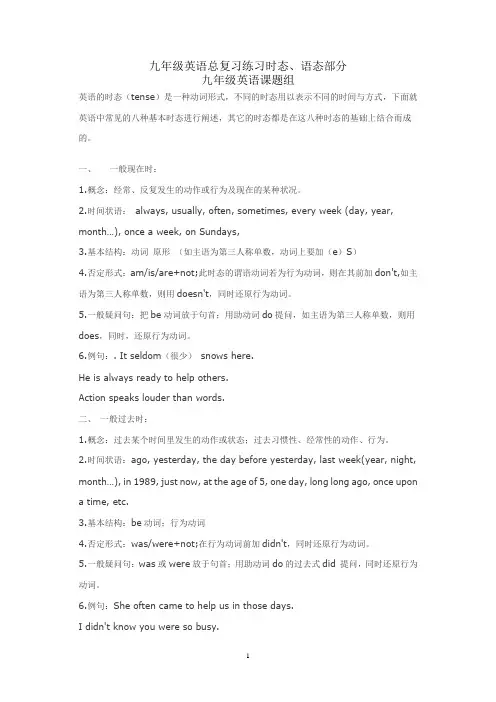
九年级英语总复习练习时态、语态部分九年级英语课题组英语的时态(tense)是一种动词形式,不同的时态用以表示不同的时间与方式,下面就英语中常见的八种基本时态进行阐述,其它的时态都是在这八种时态的基础上结合而成的。
一、一般现在时:1.概念:经常、反复发生的动作或行为及现在的某种状况。
2.时间状语:always, usually, often, sometimes, every week (day, year, month…), once a week, on Sundays,3.基本结构:动词原形(如主语为第三人称单数,动词上要加(e)S)4.否定形式:am/is/are+not;此时态的谓语动词若为行为动词,则在其前加don't,如主语为第三人称单数,则用doesn't,同时还原行为动词。
5.一般疑问句:把be动词放于句首;用助动词do提问,如主语为第三人称单数,则用does,同时,还原行为动词。
6.例句:. It seldom(很少)snows here.He is always ready to help others.Action speaks louder than words.二、一般过去时:1.概念:过去某个时间里发生的动作或状态;过去习惯性、经常性的动作、行为。
2.时间状语:ago, yesterday, the day before yesterday, last week(year, night, month…), in 1989, just now, at the age of 5, one day, long long ago, once upona time, etc.3.基本结构:be动词;行为动词4.否定形式:was/were+not;在行为动词前加didn't,同时还原行为动词。
5.一般疑问句:was或were放于句首;用助动词do的过去式did 提问,同时还原行为动词。
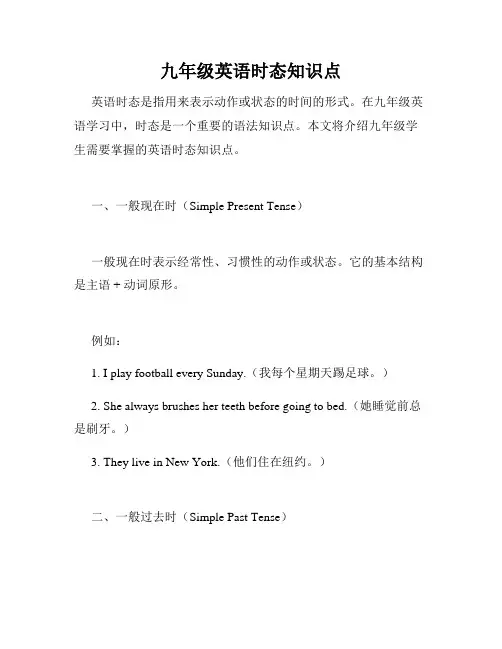
九年级英语时态知识点英语时态是指用来表示动作或状态的时间的形式。
在九年级英语学习中,时态是一个重要的语法知识点。
本文将介绍九年级学生需要掌握的英语时态知识点。
一、一般现在时(Simple Present Tense)一般现在时表示经常性、习惯性的动作或状态。
它的基本结构是主语 + 动词原形。
例如:1. I play football every Sunday.(我每个星期天踢足球。
)2. She always brushes her teeth before going to bed.(她睡觉前总是刷牙。
)3. They live in New York.(他们住在纽约。
)二、一般过去时(Simple Past Tense)一般过去时表示过去发生的具体的动作或状态。
它的基本结构是主语 + 动词过去式。
例如:1. They watched a movie last night.(他们昨晚看了电影。
)2. I lived in Beijing when I was young.(我年轻时住在北京。
)3. She bought a new dress yesterday.(她昨天买了一条新裙子。
)三、一般将来时(Simple Future Tense)一般将来时表示将来要发生的动作或状态。
它的基本结构是主语 + will + 动词原形。
例如:1. I will visit my grandparents next weekend.(下个周末我会去看望我的祖父母。
)2. She will take the train to Shanghai.(她将坐火车去上海。
)3. They will have a party on Friday.(他们将在星期五举办一个派对。
)四、现在进行时(Present Continuous Tense)现在进行时表示正在进行的动作。
它的基本结构是主语 +am/is/are + 动词-ing 形式。
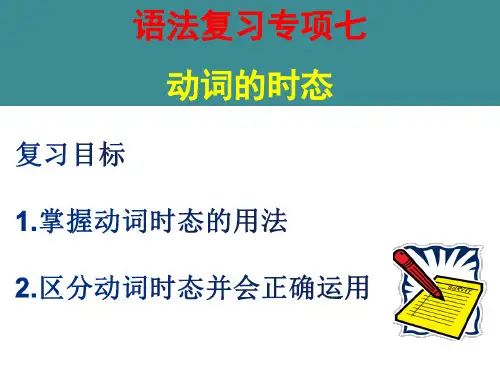
Ⅰ. 初中英语八种时态归纳复习时态是英语学习中一个至关重要的内容,广大初中学生在实际运用时,往往对时态总是倍感棘手,下面我们就归纳复习一下這几种时态。
一、一般现在时:概念:经常、反复发生的动作或行为及现在的某种状况。
时间状语:always, usually, often, sometimes, every week (day, year, month…), once a week, on Sundays, etc.基本结构:①be动词;②行为动词否定形式:①am/is/are+not;②此时态的谓语动词若为行为动词,则在其前加don't,如主语为第三人称单数,则用doesn't,同时还原行为动词。
一般疑问句:①把be动词放于句首;②用助动词do提问,如主语为第三人称单数,则用does,同时,还原行为动词。
二、一般过去时:概念:过去某个时间里发生的动作或状态;过去习惯性、经常性的动作、行为。
时间状语:ago, yesterday, the day before yesterday, last week(year, night, month…), in 1989, just now, at the age of 5, one day, long long ago, once upon a time, etc. 基本结构:①be动词;②行为动词否定形式:①was/were+not;②在行为动词前加didn't,同时还原行为动词。
一般疑问句:①was或were放于句首;②用助动词do的过去式did 提问,同时还原行为动词。
三、现在进行时:概念:表示现阶段或说话时正在进行的动作及行为。
时间状语:now, at this time, these days, etc.基本结构:am/is/are+doing否定形式:am/is/are+not+doing.一般疑问句:把be动词放于句首。
- 1 - 一般现在时一.一般现在时用于表示现在的状态,如:He is twelve./She is at work./My father is a doctor. 表示经常的或习惯性的动作,通常与alwys,usually,often,sometimes,seldom,three times a day, every day(week,month---)等表示频度的时间状语联用如:I get up at 6:30 every day.表示主语具备的性格和能力等,如:She likes noodles. / They speak French. 表示客观事实或真理,如:The sun rises from the east and set in the west.一般现在时的构成。
1.be动词。
在一般现在时中be动词有三种形式:am, is, are. 其中am只用于主语是I的情况;主语是第三人称单数用is;其他人称用are。
第一人称:指“我”、“我们”,即I,we。
第二人称:指“你”、“你们”,即you。
第三人称:除第一、二人称外都是第三人称。
第三人称单数:包括代词he,she,it,可数名词单数和不可数名词做主语时都是第三人称单数。
第三人称复数:包括代词they,可数名词两个或两个以上为复数,不可数名词没有复数形式。
如:I am a student. Y ou are 11 years old. He is at work. She is a Japanese girl. It is fine today. They are from Korea.2.如果谓语动词不用be动词。
那么,当句子的主语为单数第三人称以外时,在肯定句中,谓语动词用原形。
如:I do my homework every day.We study Chinese, Math and English at school. Y ou work in a supermarket,don’t you? They go to school bu bus. The boys often play basketball on the playground. 当主语为第三人称单数时,在肯定句中,谓语动词要用第三人称单数形式(简称三单形式)。
初三英语时态语态复习语态1( ) 1 The People's Republic of China ___ on October 1, 1949.A. foundB. was foundedC. is foundedD. was found ( ) 2 English ____ in Canada.A. speaksB. are spokenC. is speakingD. is spoken ( )3 This English song___ by the girls after class.A. often singsB. often sangC. is often sangD. is often sung ( ) 4 This kind of car ___ in Japan.A, makes B. made C. is making D. is made ( ) 5 New computers ___ all over the world.A. is usedB. are usingC. are usedD. have used2( ) 1 Our room must ___ clean.A. keepB. be keptC. to be keptD. to keep( ) 2 -I'd like to buy that coat. -I'm sorry. ___.A. it soldB. it's sellingC. It's been soldD. it had been sold ( ) 3 A new house ___ at the corner of the road.A. is buildingB. is being builtC. been builtD. be building ( ) 4 The key ___ on the table when I leave.A. was leftB. will be leftC. is leftD. has been left ( ) 5 Doctors ___ in every part of the world.A. needB. are needingC. are neededD. will need ( ) 6 His new book___ next month.A. will be publishedB. is publishingC. is being publishedD. has been published3( ) 1 Japanese ___ in every country.A. is not spokenB. are spokenC. is speakingD. is not speaking ( ) 2 These papers___yet.A. have not writtenB. have not been writtenC. has not writtenD. has not been written( ) 3 The sports meet ___ be held until next week.A. didn'tB. won'tC. isn'tD. doesn't4( ) 1 -My shoes are worn out.A. Can't they be mended?B. Let me have a look at it.C. How much do they cost?D. Can't they mended?( ) 2 ___ the watch been repaired yet? I badly need it.A. DoesB. HasC. IsD. Are( ) 3 ___ these desks be needed?A. WillB. AreC. HasD. Do5( ) 1 Why ___ to talk about it yesterday?A. didn't a meeting holdB. wasn't a meeting heldC. wasn't held a meetingD. a meeting wasn't held( ) 2 Who was the book___?A. writeB. wroteC. writtenD. written by( ) 3 Where ___ these boxes made?A. wasB. wereC. isD. am6( ) 1 The flowers___often.A. must be waterB. must be wateredC. must wateredD. must water ( ) 2 The books may___ for two weeks.A. be keptB. be borrowedC. keepD. borrow ( ) 3 The broken bike____ here by Mr Smith.A. can mendB. can mendedC. can be mendD. can be mended 7( ) 1 The old bridge in my hometown___ next month.A. is going to be rebuiltB. will rebuiltC. are going to be rebuiltD. are going to rebuilt( ) 2 The play ___ at the theatre next Sunday.A. is going to be shownB. will shownC. will showD. is shown ( ) 3 The old stone bridge ___ next week.A. is going to be rebuiltB. will be rebuildC. are going to be rebuiltD. will rebuild8( ) 1 Now these magazines___ in the library for a long time.A. have keptB. are keepingC. have been keepingD. have been kept ( ) 2 The pot ___ for ___ hot water.A. used; keepingB. was used; keepingC. is used; to keepD. are used; keep ( ) 3 Tea ___ in the south of China.A. growsB. is grownC. were grownD. will grow ( ) 4 The bridges___ two years ago.A. is builtB. builtC. were builtD. was built ( ) 5 Wet clothes are often ___ up near a fire in rainy weather.A. hangB. hangedC. hangingD. hung9( ) 1 The river smells terrible. People must ___ dirty things into it.A. be stopped to throwB. be stopped from throwingC. stop to throwD. stop from throwing( ) 2 The teapot ___ water.A. is filled withB. filled ofC. fulling ofD. filled( ) 3 Old people must be looked ^fter well and ___ politely.A. speak toB. spokenC. speakD. spoken to ( ) 4 Old people must ___.A. look after wellB. be looked well afterC. looked well afterD. be looked after well10( ) 1 Newly-born babies___in hospital.A. are taken good careB. are taken good care ofC. take good care ofD. take good care( ) 2 They were___ at the sudden noise.A. frighteningB. frightenedC. frightenD. frightens ( ) 3 These walls___stone.A. are made ofB. made of uC. are made intoD. made into11( ) 1 Jane ___ to sing us an American song last Saturday.A. calledB. was askedC. toldD. was said ( ) 2 The papers ___ to them.A. were shownB. showC. shownD. have shown( ) 3 The coat___her sister.A. made toB. were made forC. was made forD. was made to时态1.Sales of CDs have greatly increased since the early 1990s, when people ________ to enjoy the advantages of this new technology.A.beginB.beganC.have begunD.had begun2.Turn on the television or open a magazine and you ________ advertisements show ing happy families.A.will often seeB.often seeC.are often seeingD.have often seen3.—I hear Jane has gone to the Holy Island for her holiday.—Oh, how nice! Do you know when she ________?A.was leavingB.had leftC.has leftD.left4.—What were you doing when Tony phoned you?—I had just finished my work and________ to take a shower.A.had startedB.startedC.have startedD.was starting5.I ________ you not to move my dictionary—now I can’t find it.A.askedB.AskC.was askingD.had asked6.—Has Sam finished his homework today?—I have no idea. He ________ it this morning.A.didB.has doneC.was doingD.had done7.—What’s that terrible noise?—The neighbors ________ for a party.A.have preparedB.are preparingC.prepareD.will prepare8.Now that she is out of a job, Lucy ________ going back to school, but she hasn’t decided yet.A.had consideredB.has been consideringC.consideredD.is going to consider9.The teacher, with 6 girls and 8 boys of her class, ________ visiting a museum w hen the earthquake struck.A.wasB.wereC.had beenD.would be10.The discussion ________ alive when an interesting topic was brought in.A.was comingB.had comeC.has comeD.came11.Because the shop ________ , all the T-shirts are sold at half price.A.has closed downB.closed downC.is closing downD.had closed down12.Let’s keep to the point or we ________ any decisions.A.will never reachB.have never reachedC.never reachD.never reached13.My mind wasn’t on what he was saying so I’m afraid I ________ half of it.A.was missingB.had missedC.will missD.missed14.It is said in the book that Thomas Edison (1847—1931) ________ the world-lead ing inventor for sixty years.A.would beB.has beenC.had beenD.was15.—You were out when I dropped in at your house.—Oh, I ________ for a friend from England at the airport.A.was waitingB.had waitedC.am waitingD.has waited16.She has set a new record, that is, the sales of her latest book _____ 50 million.A.have reachedB.has reachedC.are reachingD.had reached17.He kept looking at her, wondering whether he ________ her somewhere.A.sawB.has seenC.seesD.had seen18.The crazy fans ________ patiently for two hours and they would wait till the mo vie star arrived.A.were waitingB.had been waitingC.had waitedD.would wait19.She ________ her hairstyle in her hometown before she came to Chongqing fora better job.A.would changeB.has changedC.changedD.was changing20.The first use of atomic weapons was in 1945, and their power ________ increased enormously ever since.A.isB.wasC.has beenD.had been21.—You haven’t said a word about my new coat, Brenda. Do you like it?—I’m sorry I ________ anything about it sooner. I certainly think it’s pre tty on you.A.wasn’t sayingB.don’t sayC.won’t sayD.didn’t say22.All morning as she waited for the medical report from the doctor, her nervousnes s ________.A.has grownB.is growingC.grewD.had grown23.Why don’t you put the meat in the fridge? It will _____ fresh for several days.A.be stayedB. StayC.be stayingD.have stayed24.How can you possibly miss the news? It ________ on TV all day long.A.has beenB.had beenC.wasD.will be25.-Sorry to have interrupted you. Please go on.-Where was I?-You ________ you didn’t like your father’s job.A.had saidB.saidC.were sayingD.had been saying语态参考答案:1. 1-5 B D D D C2. 1-6 B C B B C A3. 1-3 A B B4. 1-3 A B A5. 1-3 B D B6. 1-3 B A D7. 1-3 A B A8. 1-5 D B B C D9. 1-4 B A D D10. 1-3 B B A11. 1-3 B A C时态BADDA CBBADCADDA ADBCCDCBAC。
初三英语动词的时态语态关于时态一般现在时:用法:经常性和习惯性的动作常用时间状语:often,usually,always,everyday,sometimes等动词构成:动词原型/动词+s(主语是第三人称单数)否定构成:don’t/dones’t+动词原型注意,客观真理在从句中也用一般现在时。
现在进行时:用法:说话时正在进行的动作或当前一段时间正在进行的动作常用时间状语:now,these days等动词构成:is/am/are+—ing(动词现在分词)否定构成:is/am/are+not+现在分词注意,go,e,leave,arrive,return,die等的进行时有时表示即将发生的动作一般将来时:用法:将来会出现或发生的动作常用时间状语:tomorrow,next mouth,this evening,in a few minutes等动词构成:1,will/shall+动词原型 2,am/is/are going to+动词原型3,am/is/are+(about)+to+动词原型 4,am/is/are+ing等现在分词以work为例:will/shall work am/is/are going to work am/is/are(about) to work am/is/are ing/leaving…否定构成:will/shall+ not am/is/are+not注意,在if条件或as soon as等时间状语从句中用一般现在时代替一般将来时。
一般过去时:用法:过去时间发生的或过去经常性的动作常用时间状语:yesterday,last night,two days ago, in 2000,at thattime,before liberation,when 等引导的含过去时的句子动词构成:动词过去时(--ed)否定构成:didn’t+动原注意,He has opened the door.(表示过去“开门”的动作对现在的影响是门还开着)He opened the door.(不能确定门现在是否开着)现在完成时:用法: 1、发生在过去的动作且对现在仍有影响的动作,强调对现在的影响.2、从过去一直延续到现在的动作常用时间状语:already,just,never,before,recently,in the past few years ,ever,sofar,since+过去的点时间,for+一段时间动词构成:have/has+过去分词(--ed)否定构成:have/has not+过去分词注意:暂时性动词不能与for…, since…,How long…等表示段时间的短语同时使用过去完成时:用法:1、过去某时间或动作之前完成的动作或状态(过去的过去)。